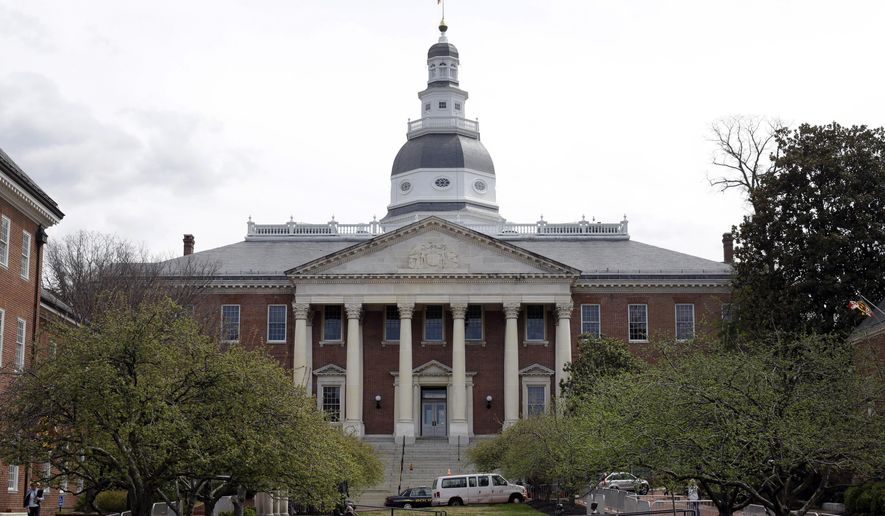ANNAPOLIS — State lawmakers debated whether changing police officers’ rights would foster trust between law enforcement and local communities Tuesday, just days before the state’s highest court is set to hear an appeal from one of six Baltimore officers charged in the police-custody death of Freddie Gray in April.
Maryland’s legislative and judicial proceedings come amid a national focus on police tactics and training following the deaths of several unarmed black men in altercations with officers, as jurisdictions across the country employ various means — from resolution counseling to police body cameras — to ensure public safety.
This session of the Maryland General Assembly already has seen more than two-dozen bills introduced to address police relations with the public as well as to better monitor the actions of officers and discipline them.
A legislative workgroup formed after Gray’s death and the ensuing unrest in Baltimore recommended several changes to the Law Enforcement Officer Bill of Rights, including allowing witnesses to police-involved incidents to submit video evidence, extending the time victims can file complaints against officers from 90 days to a year, and restricting the time officers have to retain an attorney after an incident from 10 days to five days.
Sen. Catherine Pugh, the Baltimore Democrat who led the workgroup, said she hopes the changes will encourage residents to be more engaged with police.
“I stood on corners in Baltimore during the unrest,” Ms. Pugh told the Judicial Proceedings Committee on Tuesday. “No one should feel, when they walk by police officers, that they should fear for their lives. That’s not true, they’re here to serve and protect.”
SEE ALSO: Pepco-Exelon merger appears dead as D.C. mayor, people’s counsel oppose revised deal
During the hourslong debate, the bill’s supporters and opponents heatedly argued over whether the proposed changes would result in better community policing and increase trust between residents and police.
Vince Canales, president of the Fraternal Order of Police, said the Law Enforcement Officer Bill of Rights is essentially an employee manual and has to do with internal administrative actions, so changing it would not tackle the real problem of at hand.
“How do you legislate trust?” Mr. Canales said. “This bill in and of itself still creates a vacuum and leaves a situation where a lot of the issues and concerns are going to wind up being out there and creating a problem for certain constituencies. It does nothing to address the perception problem going on.”
Several rights advocates, including the American Civil Liberties Union, the NAACP and the No Boundaries coalition, backed the bill’s intent but said civilians must be a part of internal disciplinary police review boards to ensure transparency and fairness.
On Thursday, the Court of Appeals will hear oral arguments on whether one of the six officers charged in Gray’s death can be compelled to testify against the other five.
Baltimore Circuit Court Judge Barry Williams ruled in January that Officer William Porter could not be compelled to testify against his colleagues, after Officer Porter’s trial ended in a hung jury in December. Prosecutors have insisted that his testimony is key in the other cases.
SEE ALSO: Atheists appeal federal court ruling on cross on public land in Bladensburg, Md.
The trials of police Lt. Brian Rice, Sgt. Alicia White, and Officers Cesar Goodson, Garret Miller and Edward Nero have been postponed pending the outcome of the high court hearing. The officers face an array of charges from misconduct in office to assault and second-degree murder.
Gray died after sustaining a broken neck while riding, handcuffed and shackled, in the back of a police van in April. Days of protests, rioting and looting in Baltimore followed his funeral, and his death added fuel to the Black Lives Matter protest movement against police actions that have killed black men around the country.
During Tuesday’s General Assembly debate, Baltimore resident William Marrow told how his 23-year-old nephew, Jeffrey Marrow, was killed by a Maryland Transit Administration Police officer in 2006. A civilian review board handling the case internally did not give the family any information, not even the name of the officer accused of shooting Jeffrey, he said.
“I’m using the term ’murder’ because it was distinctly that. I’m not making up, fabricating, pretending this did not exist. He had two young children. He had a mother. He has sisters and brothers who, and myself, his uncle, talked to him two days prior to his murder,” Mr. Marrow said. “He was shot in the back of the head running away from whatever the situation was.”
• Anjali Shastry can be reached at ashastry@washingtontimes.com.




Please read our comment policy before commenting.